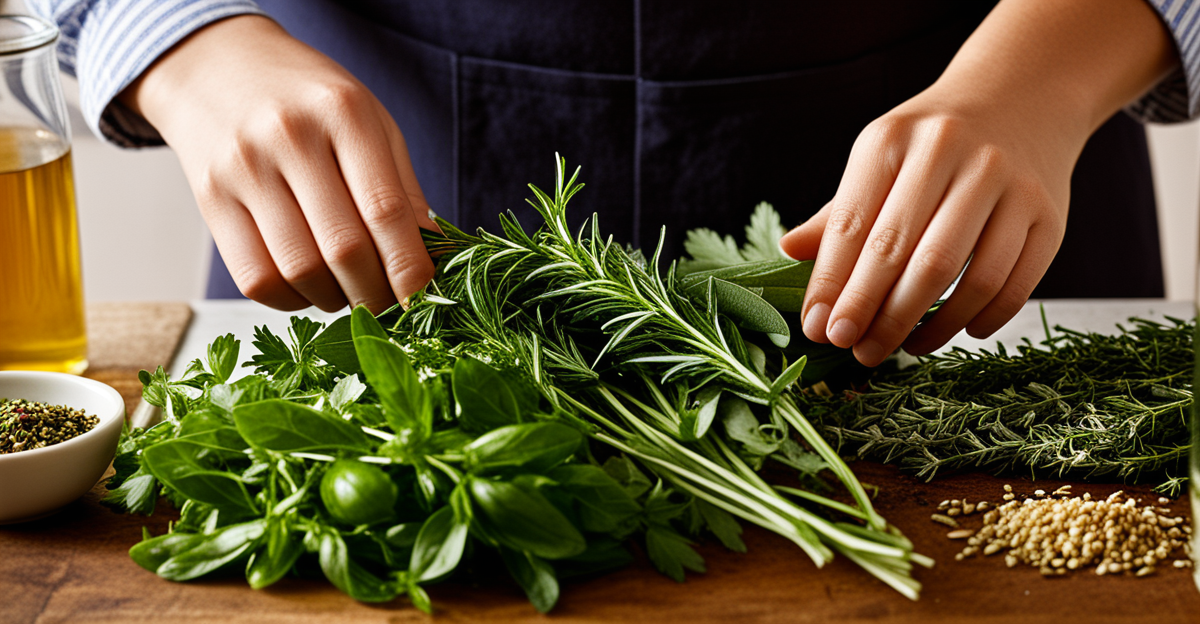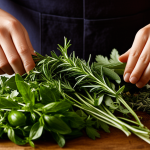Essential British Herbs for the Kitchen
Discovering British herbs familiar to many kitchens opens up a world of fresh, aromatic flavors. Common kitchen herbs like parsley, chives, mint, sage, thyme, and rosemary all have distinct flavor profiles that complement various dishes. Parsley offers a fresh, slightly peppery taste, frequently used as a garnish or in sauces. Chives provide a mild onion flavor, ideal for egg dishes and salads. Mint is prized for its cooling sweetness, great in desserts or savory meals alike.
Sage brings a robust earthiness, commonly paired with meats or stuffing, while thyme adds subtle, woodsy notes perfect for stews and roasts. Rosemary is known for its pine-like flavor, fantastic with grilled foods.
Additional reading : How can you replicate the flavors of a traditional Scotch egg?
When sourcing, fresh British herbs are preferable for intense flavor, but dried versions work well when fresh aren’t available. Fresh herbs should be purchased locally or grown at home for maximum aroma, while dried herbs require proper storage to maintain potency. Whether fresh or dried, these British herbs play a crucial role in elevating everyday cooking with their unique and versatile herb flavors.
Simple Ways to Add British Herbs to Breakfast
Breakfast recipes with herbs unlock fresh, vibrant flavors that make mornings more enjoyable. British herbs bring variety and nutrition to breakfast dishes, making them both tasty and healthy. For example, chives work wonderfully in scrambled eggs, lending a delicate onion flavor without overpowering the dish. Sprinkle chopped chives just before serving to preserve their subtle aroma.
Also to read : How can you make a rich and creamy cauliflower cheese?
Mint, another popular British herb, transforms plain yogurt or porridge into refreshing morning treats. Adding finely chopped mint to smoothies or fruit bowls can create a sweet, cooling contrast that brightens heavy breakfasts.
Preparation is key for breakfast recipes with herbs. Herbs should be washed thoroughly and chopped finely to release their full herb flavors without clumping or dominating the dish. Adding herbs at the end of cooking preserves their fragrance and impact, especially with delicate options like chives and mint.
Starting your day with British herbs in morning meals is simple and rewarding. Whether enhancing eggs, porridges, or yogurts, incorporating common kitchen herbs offers an easy way to enjoy fresh flavors early in the day. These small additions make breakfasts flavorful and visually appealing, encouraging a positive, healthy start.
Lunch Ideas Featuring British Herbs
Adding British herbs to lunch recipes with herbs is a straightforward way to elevate midday meals. Herb-infused salads benefit greatly from common kitchen herbs like parsley, mint, and thyme. For instance, mixing chopped parsley and mint into a fresh salad introduces bright, lively herb flavors that balance rich dressings and vegetables.
Sandwich seasoning also thrives with herb additions. A simple spread of sage butter or tarragon mayonnaise can transform an ordinary sandwich or wrap into a flavour-packed delight. Sage offers a warm, earthy note perfect for poultry sandwiches, while tarragon adds a slight anise-like sweetness that pairs well with chicken or egg fillings.
Leftover herbs from breakfast or other meals provide excellent opportunities for quick lunchtime flavour boosts. Classically, chives sprinkled on top of soups or mixed into potato salads brighten the dish without overpowering it.
When incorporating British herbs in lunch recipes with herbs, remember that fresh herbs release their herb flavors best when added towards the end of preparation. This retains their aroma and nutritional value, ensuring your lunch is both delicious and wholesome. Using these versatile British herbs daily enhances meals with fresh textures and tastes effortlessly.
Enhancing Dinner Dishes with British Herbs
British herbs add remarkable depth to dinner recipes with herbs, transforming everyday meals into memorable dishes. Pairing common kitchen herbs such as rosemary, thyme, sage, and parsley with meats enhances flavors significantly. For instance, rosemary’s pine-like aroma complements roasted lamb, while thyme’s subtle woodsy notes work well with roasted chicken or fish. Sage is ideal for rich, hearty dishes like pork or stuffed vegetables, providing a warm, earthy flavor.
Herb-based sauces and marinades are excellent for infusing dishes with herb flavors. A simple marinade combining chopped rosemary, thyme, garlic, and olive oil tenderizes meat while imparting fresh herb notes. Similarly, parsley-based chimichurri offers a zesty, green freshness that brightens grilled fish or vegetables.
Vegetarian dishes benefit from the vibrant profile of British herbs too. Adding chopped mint and parsley to grain bowls or vegetable stews creates balanced, refreshing flavors that avoid heaviness.
Cooking with British herbs at dinner allows for creativity and variety. Using fresh versus dried herbs depends on desired intensity; fresh herbs provide a brighter, more vibrant taste, ideal when added near the end of cooking to retain aroma and flavor. Simple herb additions elevate main meals effortlessly, making British herbs a kitchen essential for dinner recipes with herbs.
Practical Tips for Storing and Preparing British Herbs
Proper herb storage is essential to maintain the vibrant aroma and flavor of British herbs. Fresh herbs like parsley, chives, and mint keep best when stored in the fridge. Wrap them gently in a damp paper towel and place in a sealed container or resealable bag. This method preserves moisture without causing wilting. Alternatively, placing fresh herbs upright in a glass of water, similar to cut flowers, extends freshness for several days.
Dried herbs require cool, dark storage in airtight containers to protect their potent herb flavors. Exposure to light and heat diminishes taste and aroma, so a pantry away from the stove or window is ideal.
When preparing herbs, washing thoroughly under cold water removes dirt and residual pesticides. Pat dry carefully to avoid bruising delicate leaves, which can release essential oils prematurely and reduce flavor.
Chopping herbs finely releases their full herb flavors, but timing is crucial. Adding chopped herbs near the end of cooking preserves aroma, while early addition mellows intensity. For some recipes, using whole sprigs during cooking and removing before serving delivers subtle, layered herb notes without overpowering the dish.
Following these straightforward preparation techniques ensures you get the most from your British herbs, enhancing any dish with fresh, vibrant tastes.
Quick and Versatile Herb Recipes for Everyday Meals
Incorporating British herbs in daily cooking offers flavorful, effortless ways to enhance any dish. One popular quick herb recipe is a herby butter blend. Simply soften butter and mix in finely chopped parsley, chives, and thyme. This versatile spread adds rich, fresh herb flavors to bread, steamed vegetables, or grilled meats, providing an easy upgrade to everyday meals.
A simple pesto with British herbs is another excellent choice. Use a base of fresh parsley or mint combined with garlic, nuts, and olive oil to create a vibrant sauce. This pesto pairs well with pasta, roasted vegetables, or as a sandwich spread, delivering bold herb flavors without complicated steps.
Homemade salad dressings infused with herbs like rosemary, sage, or thyme are quick to prepare and elevate salads instantly. Mix olive oil, vinegar, mustard, and chopped herbs for fresh, aromatic dressings. These dressings allow you to integrate British herbs into lunches or dinners with minimal effort.
Finally, infused oils and vinegars capture herb flavors for long-term use. Adding fresh rosemary or thyme sprigs to oil or vinegar bottles creates flavorful bases for cooking or dressing, making it easy to incorporate herb flavors anytime.
These quick herb recipes demonstrate how common kitchen herbs bring freshness, aroma, and vibrant tastes to everyday cooking, ensuring meals remain delightful and varied.
Essential British Herbs for the Kitchen
British herbs like parsley, chives, mint, sage, thyme, and rosemary are cornerstones of many kitchens thanks to their versatile herb flavors. Parsley provides a fresh, slightly peppery taste that brightens sauces and garnishes. Chives contribute a mild onion flavor, perfect for egg dishes or salads. Mint adds a cooling sweetness, balancing both savory and sweet breakfast or dessert recipes.
Sage delivers a robust, earthy depth frequently paired with rich meats or stuffing. Thyme offers subtle woodsy notes that suit stews and roasts well. Rosemary’s distinctive pine-like aroma enhances grilled or roasted dishes, especially lamb and chicken.
When sourcing British herbs, fresh versions yield the most vibrant flavors and aromas. Local markets or home gardens are excellent places to find or grow these. However, dried herbs are convenient substitutes when fresh are unavailable, though they often offer a milder taste. Proper storage of dried herbs—in cool, dark, airtight containers—is essential to maintaining potency.
Choosing between fresh and dried herbs depends on the desired intensity and cooking time. Fresh herbs are typically added near the end of cooking to preserve their fragrant herb flavors, while dried herbs integrate well into longer simmering recipes. This flexibility makes common kitchen herbs indispensable for adding flavourful depth to any dish.






